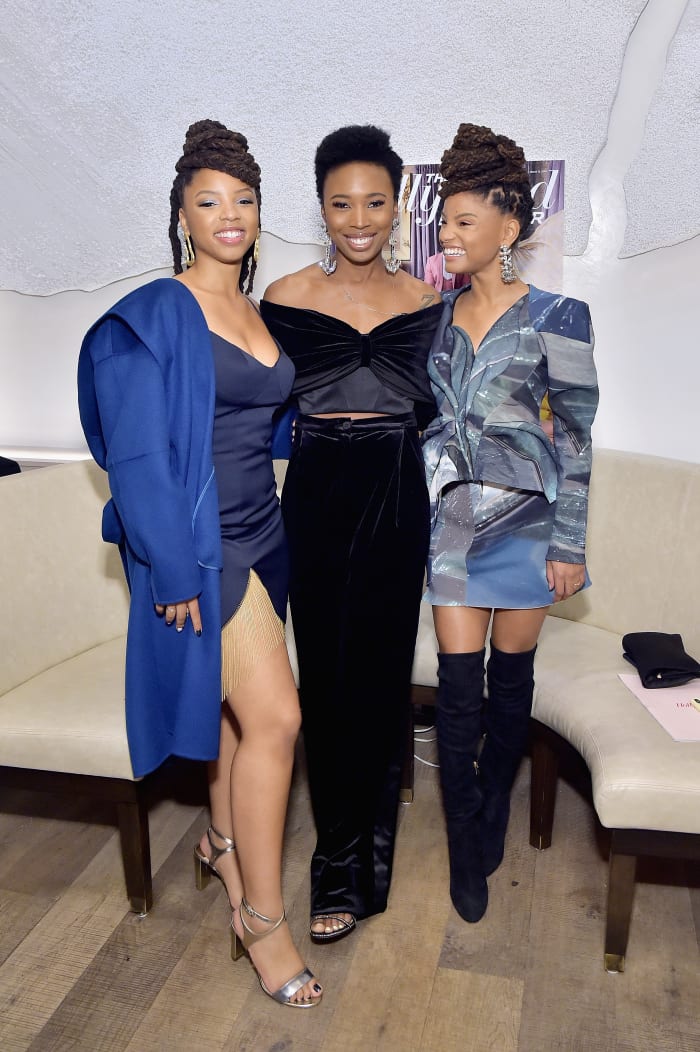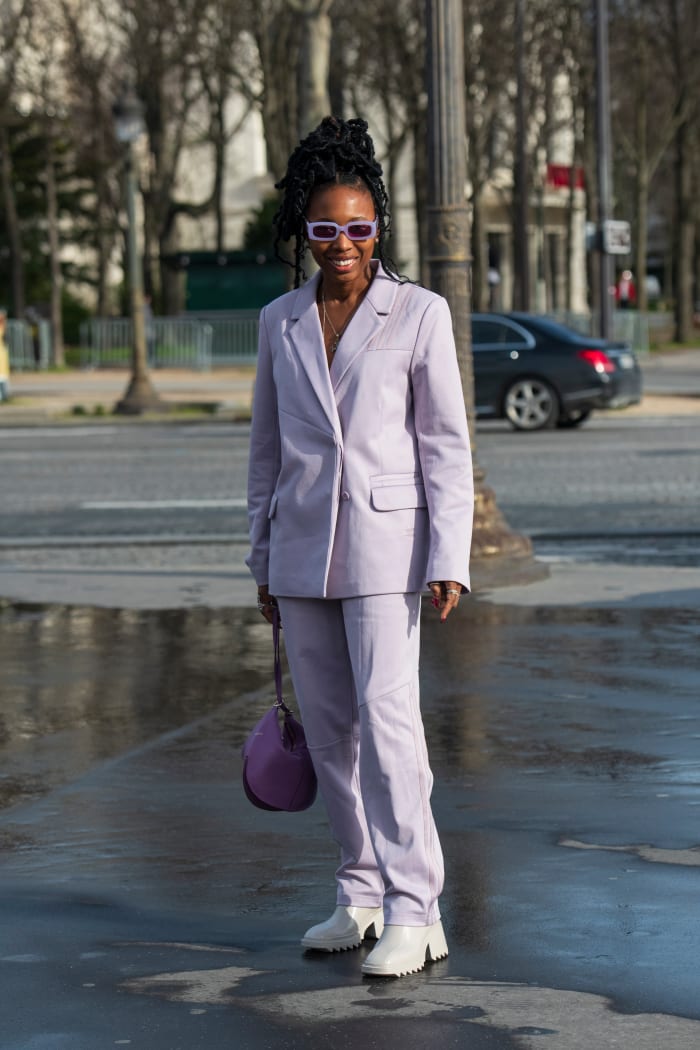We all buy clothes, but no two people shop the same. It can be a social experience, and a deeply personal one; at times, it can be impulsive and entertaining, at others, purpose-driven, a chore. Where do you shop? When do you shop? How do you decide what you need, how much to spend and what’s “you”? These are some of the questions we’re putting to prominent figures in our column “How I Shop.”
Like many celebrity stylists who found themselves with a spate of cancelled events earlier this year, Zerina Akers has been busy with a side project: After the murder of George Floyd incited an anti-racist uprising, Akers lauched Black Owned Everything, an Instagram account to share and highlight Black-owned brands, especially in the fashion and beauty spaces, as a resource for people who found themselves wanting to pour some of their spending money into the Black community.
“Everyone just started flooding our timelines with all of their favorite Black-owned brands and companies, and I wanted to have a place online that I could kind of house and hoard the information so when I went shopping for clients or myself, I had a place that I could go,” the Los Angeles-based stylist, who works with the inimitable Beyoncé and Chloe x Halle, tells me over the phone. “Everything was just so beautiful. There was no way to keep it to myself, so I made the decision to make the page public and announce it like, ‘Hey, I started this page.’ I just thought it was a cute little thing.”
It didn’t stay little, hitting 20,000 followers within a week and just growing from there. Beyoncé then shared the list on her website amid her “Black Is King” launch, and it blew up, bringing a major lift in visibility to brands like Hanifa and Leimert Park Threads. Now, Akers is working on turning it into a functioning shopping platform, set to launch later this month. She’s also launching an incubator for small brands called the Acres to Acres Foundation that will help them achieve financial literacy and connect to manufacturers.
Akers has always been passionate about supporting smaller brands, whether that’s through her styling work or shopping for herself. She also recently appeared on American Express’s Built to Last “vodcast” series (watch it here) that spotlights small Black-owned brands and their owners.
“The way that people are shifting their consciousness to supporting smaller businesses, I just think it’s really important right now,” she says.
Below, Akers tells us about some of her favorite small brands, how she’s been dressing in quarantine, and how she acts as a “billboard” for her own work.
“My aunt used to take us to this place called E.J. Roberts. It’s a discount warehouse fashion [store], but we would just go in there and find what we thought at the time were just the coolest things and the most unique things that not a lot of people had, [like] satin quilted bombers. And my cousin and I — I would wear the pink one, she would get the blue one…
Every weekend my brother had a basketball game and then we would go and buy sneakers after the basketball game, it was like a ritual. But my brother and my cousin, they would buy like Jordans and Nikes, and I would buy Payless shoes because I could get like three of them.
[My first big splurge] was pair of Fendi sunglasses. They were on sale for $80. They were half off and I probably spent my whole check on it, my whole summer camp check for the week, I was 15 or something.
My personal style is a little bit of everything. I take myself very seriously, unfortunately, but I try not to box myself in. I am a little bit of a tomboy, so I love androgynous clothing and menswear-inspired things like oversize suiting and monochromatic suiting. Why I say I take myself seriously is because I love to feel powerful. I love things that make me feel tall and strong and powerful when I walk in the room and when I walk into a meeting. But then I also love to play with color. I rarely wear black.
Even in my styling work, I typically am playing with a ton of color and combos. It’s definitely evolved over time but it still remains experimental. I love twisted basics, taking something that’s very simple and very classic, but with an edge or with a twist.
I have always been a huge fan of the seventies. I just felt like they were having so much fun and it was at a time where things were a little bit lighter politically, and it felt a bit more inclusive at the time with the parties and the style and everyone was experimenting with their hair. Some of the best things, from Afros to blowouts to jumpsuits and sequins and bright, vibrant colors from Halston, they’re all very prominent today. Even the suiting was stunning, like Yves Saint Laurent suits. You could [also] still buy things that were affordable, and it was still impactful and made for a timeless photograph.
I spend 90% of my time in a sweatsuit because of all the running around and all the schlepping [for my job], but when it comes to being a bit more forward-facing, I almost have to put in the effort and continue that fun and that vibrancy, because it inspires and excites the client. It can be a double-edged sword because you may show up with something and [the client’s] like, ‘Wait, I want that, I want what you have on.’
But for the most part, you are the canvas and you are the billboard for your own work. So it’s almost like you have to be somewhat flamboyant — especially as a woman, I feel that way. It’s a persona too, you know? Even though maybe your clients can never wear what you’re wearing or maybe you don’t even want to, they just want to know that it’s coming from a respectable, trustworthy source.
[In quarantine,] I wake up when it’s cold and just put on my sweatsuit and go on about it. Or workout clothes if I end up working out in the morning. But it does make a difference once you then just put on a pair of jeans and a blouse or a top. So it depends on how many Zooms I have that day, I’ll try to put on some sort of graphic top, wearing a pair of earrings at least. At that point I’m always afraid I’m going to get caught standing up, so I never do it halfway. I always at least put a pair of jeans on and not sweatpants.
When I’m shopping for myself, I have to love whatever it is. Because often I wear my things for many years. I really get pieces that will stand the test of time. I buy into some trends, but for the most part, if I really love something and it looks good on me, it makes me feel great, I could wear that thing either over and over again every day or continue to bring it out.
To take from Marie Kondo, it has to bring me joy. But I also don’t shop as often, as a stylist. It’s kind of shifted for me because then shopping became work. I used to, just to kill time, walk around and window shop and see what was out there, but when you’re doing that constantly for work, it doesn’t quite feel the same.
I am an instant-gratification kind of girl. There’s certain things [that] if I see it online, I’m like, ‘Oh man, I have to have that thing.’ [There was] one Adidas track suit that I really wanted by Danielle Cathari and I bought that online. But I rarely shop for fashion online because I don’t like to do to the returns. I like to try things on. I’m definitely more of an in-person shopper, but at the moment, none of us can really do that, right? So I’m kind of relying on look books and ordering.
I used to be a big handbag person and I would always spend a little money on purses because I felt like, a bag you can wear every day, where clothes, you maybe wear it once or twice or whatever. So I would spend less money on my clothes, more in the accessories. But now, I was reorganizing the closet where my bags are and I was like, ‘Uh oh, this is a little crazy now.’ A lot of it’s gifted stuff.
In that same breath, I am constantly supporting the smaller brands in our community. I just try to support and pay for it and order the things [as opposed to accepting them as gifts]. Especially because you get so much for free, you’re not shopping, so you should spread the wealth.
I try to purge [my wardrobe] relatively often, but I keep a lot. If I’m getting things of quality that are exciting, I could use it for styling purposes. I could wear it, keep it, and then use it there if I have a commercial to style or something.
I don’t really have favorite retailers. It’s really like, do you have that item…I find that many retailers at the moment aren’t really in touch, so it’s more so [shopping] directly from the brands.
I really love Brandon Blackwood, he has really cool bags, like that End Systemic Racism bag. Hanifa. Aziza Handcrafted, it’s really cool jewelry, and then L’Enchanteur: They’re these twins that just made this really cool earring [with us] I’m really excited about. We did the Black Owned Everything logo and it’s on a pair of hoops. [I bought] the Carlton Yaito bandana bag…
Once I started Black Owned Everything, [finding new brands] was all really organic growth in terms of people just sharing their favorite brands and wanting to support their friends and sharing their own things that they’ve created. Now it’s almost harder to keep up with. You don’t want people to get lost in the algorithm. [I’m either] finding [brands] online or researching some of the younger graduates coming out of school.”
This interview has been edited and condensed for clarity.
Never miss the latest fashion industry news. Sign up for the Fashionista daily newsletter.







More Stories
Ugg boots’ 2021 comeback – best styles to shop, Editor’s picks
Go well with up with a luxurious face mask from Very long Island shop
See and Shop Parade’s Common Underwear Assortment